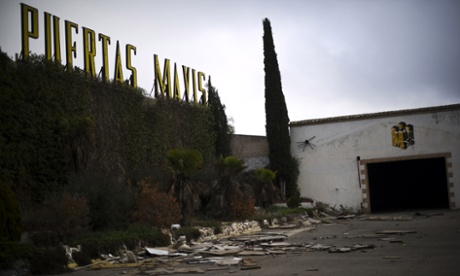| ||||
http://www.zerohedge.com/news/2013-04-10/here-we-go-cyprus-sell-%E2%82%AC400-million-gold-finance-part-its-bailout
( Start focus on the gold heading out the door from the PIIGS as the " template " hits home )
Here We Go: Cyprus To Sell €400 Million In Gold, About 75% Of Its Total Holdings, To Finance Part Of Its Bailout
Submitted by Tyler Durden on 04/10/2013 10:38 -0400
Curious why every bank and their grandmother, and most recently Goldman today, has been lining up to push the price of gold as low as possible? Here's why:
- CYPRUS TO SELL 400 MLN EUROS WORTH OF GOLD RESERVES TO FINANCE PART OF ITS BAILOUT - TROIKA DOCUMENTS - RTRS
Or about 10 tons of gold. But... the bailout was prefunded and there was no need to provide any additional cash? What happened: was the deposit outflow discovered to have been even greater than the worst case scenario and thus Cyprus needed even more cash? As for the buyers? We will venture a guess: central banks buying at the lows.
Finally: congratulations Cypriots. You are now handing over your gold for the one time, unbeatable opportunity to remain a vassal state to the Eurozone. But at least you have your €.
The good news: Cyprus will have at least another 4 or so tons after selling the 10 demanded now, before the Troika kindly requests that Cypriot citizens sell a kidney or two to pay for the ongoing deposit outflow from its insolvent banks, and indirectly, the endless bailout of the Euro.
Full story from Reuters:
Cyprus has agreed to sell excess gold reserves to raise around 400 million euros and help finance its part of its bailout, an assessment of Cypriot financing needs prepared by the European Commission showed.The draft assessment, obtained by Reuters, also said that Cyprus would raise 10.6 billion euros from the winding down of Laiki Bank and the losses imposed on junior bondholders and the deposit-for-equity swap for uninsured deposits in the Bank of Cyprus.Nicosia would get a further 600 million euros over 3 years from raising the corporate income tax rate and the capital gains tax rate.Out of the total Cypriot financing needs of 23 billion euros between the second quarter of 2013 and the first quarter of 2016, the euro zone bailout fund will provide 9 billion euros, the International Monetary Fund 1 billion and Cyprus itself will generate 13 billion, the assessment said.
http://hat4uk.wordpress.com/2013/04/10/global-looting-an-acceleration-of-desperation-as-the-sovereigns-join-forces/
GLOBAL LOOTING: An acceleration of desperation as the Sovereigns join forces
‘The acceleration of desperation is directly proportional to tax constipation caused by austerity legislation, inducing exponential increases in the excavation of citizen wealth-creation once banker masturbation has produced bonus escalation alongside Treasury funds bailout liberation’.
Ward’s Law of Fiscal Desperation
 George Osborne this week signed an information exchange scheme with France, Germany, Italy and Spain to catch tax evaders. As The Slog pointed outtwo days ago, Osborne could achieve all his ends and wipe out the National Debt if he simply raided those UK banks already aiding and abetting wholesale money squirrelling. But also in that Tuesday Slogpost, I concluded:
George Osborne this week signed an information exchange scheme with France, Germany, Italy and Spain to catch tax evaders. As The Slog pointed outtwo days ago, Osborne could achieve all his ends and wipe out the National Debt if he simply raided those UK banks already aiding and abetting wholesale money squirrelling. But also in that Tuesday Slogpost, I concluded:
‘Stand by for an attempt by the Global Looters to use this tax evasion reality as the excuse for stealing the savings of everyone with over £100,000 in a bank account that isn’t offshore….and represents the life-savings of a law-abiding taxpayer.’
Mr Osborne and his fellow wealth-liberators aren’t after the megarich billionaires – the Presidential candidates, multinational CEOs, Trade Ministers, Wall Street Sherman McCoys, Sark lairds, Athenian Swiss bank devotees, media moguls and Bilderberger attendees robbing their governments blind on a 24/7 basis. They wouldn’t dare. No: the game plan is to smear anyone with a six-figure sum in savings, exactly as Schäuble did when neutering Cyprus. The objective is to make it OK for Sovereigns to steal from their citizens on a globalist industrial scale, by persuading the tabloiders that “the rich” must be made to pay. But it is the prudent who will pay: the seriously rich will escape…or be tipped off as necessary.
Vince Cable has been pulling this ‘big house = rich bastard’ stunt for nigh on three years – by referring to ‘mansion taxes’. No doubt the poor folks in Blackburn believe it, but it is still complete bollocks. The ‘Russian mafia’ rationale was an equally large mound of bullsh*t employed by the Troika to excuse the rape of Nicosia.
A number of commentators around Europe are now convinced that the sudden explosion of ‘leaks’ about offshore cheating was a coordinated event designed to blur the line between rich and crooked. I’m still unsure about this myself, but given that the amount of evasion has been obvious to me for at least seven years, it is rather convenient that all the media obsession with it has spewed out of the volcano just when every western government is strapped for cash and deep in debt.
However, there is one way for citizens (millions of whom are now bombarding financial experts and advisers with requests for help in hiding their stash from the looters) to delay the process of monetary mongeese snaffling the eggs in their nest. I propose a campaign called Start at the Top First (STATOF) and then a Tsunami of emails, website threads and phone calls suggesting the obvious suspects:
Mitt Romney, Evangelos Venizelos, the entire Hollande Cabinet, Lord Green, Rupert Murdoch, the Barclay Twins, Jamie Dimon, Lloyd Blankfein, Jacob Zuma, Robert Mugabe, Nicolas Sarkozy, Wayne Swann, Coke, Pepsi, Starbucks, Stephen Hester, Lord Mandelson….(insert name of the other 45,000 other candidates here).
If we are going to have tumbrils, guillotines, and heads in baskets, then let’s make sure we get Louis XVI rather than Alexander Dumas.
http://www.zerohedge.com/news/2013-04-10/europe-extends-confiscatory-non-template-template-interbank-deposits
Europe Extends Confiscatory Non-Template 'Template' To Interbank Deposits
Submitted by Tyler Durden on 04/10/2013 14:54 -0400
While every European leader, banker, street-sweeper has made a point to use the phrase "Cyprus was not a template" in the last few weeks since D-Boom dropped his tape-bomb, it appears that in reality plans continue to push ahead to indeed 'legalize' these confiscations. As Reuters reports, European Union ministers will consider a proposal this week to impose losses on short-term interbank deposits of lenders. The proposal is part of wider talks to consider when depositors should be bailed-in. Of course, it makes sense that banks should 'not' get special treatment for their overnight lending operations to one another, but the EU leaders want to ensure that these 'sacred' deposits do not escape confiscation, "while it is acknowledged that bailing in interbank liabilities may carry certain risks; on balance, it is preferable... that these liabilities are not excluded from bail-in". Of course, this will worry the ECB as they have worked so hard to unfreeze the interbank lending market post-crisis (with their direct backstops and intermediation). So while there is no template, and Cyprus is unique, it appears the new 'resolution' laws provide a clear plan (not template) for reaching all the way down the capital structure just as they did in Cyprus (and is legally correct from a pari passu basis).
European Union ministers will consider a proposal this week toimpose losses on interbank deposits of lenders in dire financial trouble as they shape a draft EU law introducing powers that would also penalize those with big savings.Such an idea, should ministers back it, could further rattle the confidence of lenders, already nervous about draft legislation to determine who alongside shareholders should suffer losses when a bank gets into trouble....The talks follow the recent decision to impose heavy losses on some depositors in Cyprus, in return for an international bailout. That set a precedent, which is likely to be mirrored in these EU rules, making losses for large uninsured savers a permanent feature of future banking crises....ECB President Mario Draghi recentlycautioned that Cyprus's bailout was "no template", in a bid to ease market fears that bank deposits would in future be fair game for international lenders supporting struggling euro zone countries.In a document prepared by government officials in Ireland, which as holder of the rotating EU presidency will chair the ministers' gathering, they write thatinterbank deposits of less than one month should also be penalized....Customer bank deposits of up to 100,000 euros would remain protected under an existing EU law and the latest proposals touch on sums above this threshold."While it is acknowledged that bailing in interbank liabilities may carry certain risks," officials write in the document, seen by Reuters, "on balance, it is preferable ... that these liabilities are not excluded from bail-in".Such a suggestion will dismay many officials, who witnessed a freeze in interbank lending that the European Central Bank is still struggling to unblock despite having provided more than one trillion euros of cheap funds....Although some policymakers have sought to portray Cyprus and the losses suffered by depositors at two of its banks as a one-off, many experts believe it marks a dramatic change in tack in how Europe deals with troubled banks, to spare taxpayers who have been on the hook for previous bailouts....
http://www.zerohedge.com/news/2013-04-10/european-commission-lays-out-true-blueprint-future-every-european-country
The European Commission Lays Out The True Blueprint For The Future Of Every European Country
Submitted by Tyler Durden on 04/10/2013 19:20 -0400
Cyprus was the beginning. Next: every other country with a banking system in which non-performing loans are soaring (cough Sloveniacough) as a result of imploding consumer cash flows, and which needs a financial sector "resolution", which includes, among others, impairment of liabilities courtesy of the newnon-template template (and which is now spreading to European interbank deposits). And they all have Cyprus to look to because it will be the benchmark.
Luckily, earlier today as part of its just released"Assessment of the public debt sustainability of Cyprus", the European Commission was kind enough to spell out in very clear terms just what the fate of virtually every European country will be going forward.
For the gruesome details we go straight to paragraph 10 where we read...
In accordance with the [insert insolvent European country's name] authorities policy plans, major financial institution will be downsized combined with extensive bail-in of uninsured depositors, and a set of wide-ranging temporary capital controls and administrative measures. The programme is envisaged to build the foundation for sustainable growth over the long run.Nevertheless, in the short run, the economic outlook remains challenging. Real GDP is projected to contract by [insert massive amount] cumulatively in 2013-14.Short-run economic activity will be negatively affected by the immediate restructuring of the banking sector, which will impact on net credit growth and by additional fiscal consolidation measures. Temporary restrictions required to safeguard financial stability will hamper international capital flows and reduce business volumes in both domestic and internationally oriented companies. The bail-in of uninsured depositors will cause a loss of wealth, which will reduce private consumption and business investment. This, compounded by the impact of fiscal consolidation already undertaken and new measures agreed, will result in a sharp fall in domestic demand. Little reprieve can be expected from exports amid uncertain external conditions and a shrinking financial service sector.
And just for once, Europe is actually talling the truth.
Yet such is life, sad as it may be, for a continent that may have "vastly underestimated the amount of political capital that has been invested in the Euro", and "what the Euro means for the Europeans, for the Euro area."
For those still confused, it means countless years of pain, suffering and poverty. And it's all downhill from there.
http://greece.greekreporter.com/2013/04/09/spiegel-suspects-deposits-haircut-in-greece/
( Greece next for deposit thefts ? )
Spiegel Suspects Deposits Haircut in Greece
54 309
25 682
 After the suspension of a planned merger of the National Bank of Greece and Eurobank because of capitalization problems and opposition from Greece’s international lenders, the German magazine Spiegel said it believes the Greek government is planning to confiscate some of the deposits in banks as happened on Cyprus.
After the suspension of a planned merger of the National Bank of Greece and Eurobank because of capitalization problems and opposition from Greece’s international lenders, the German magazine Spiegel said it believes the Greek government is planning to confiscate some of the deposits in banks as happened on Cyprus.
25 682
 After the suspension of a planned merger of the National Bank of Greece and Eurobank because of capitalization problems and opposition from Greece’s international lenders, the German magazine Spiegel said it believes the Greek government is planning to confiscate some of the deposits in banks as happened on Cyprus.
After the suspension of a planned merger of the National Bank of Greece and Eurobank because of capitalization problems and opposition from Greece’s international lenders, the German magazine Spiegel said it believes the Greek government is planning to confiscate some of the deposits in banks as happened on Cyprus.
’The magazine said the decision raised suspicion that in an economic emergency that the government would go after bank accounts. Tax revenues are far off expectations despite big tax hikes as part of austerity measures that include pay cuts and slashed pensions.
The Troika of the European Union-International Monetary Fund-European Central Bank (EU-IMF-ECB) said it didn’t want the merger because it would create the largest lender in the country, with some 170 billion euros ($222.12 billion,) and be too big if there were solvency problems, as happened on Cyprus.
Greek Finance Minister Yannis Stournaras and a spokesman for Prime Minister Antonis Samaras have assured that despite the suspension of the merger bank accounts are safe and won’t be touched. There was no response on the Spiegel report.
http://famagusta-gazette.com/cyprus-heads-for-broke-as-cash-flow-dries-up-p18897-69.htm
Cyprus heads for broke as cash flow dries up
 |
The state must also meet payments for pensions and those claiming unemployment benefit.
|
|
• Wednesday, 10 April, 2013
|
With government coffers almost empty, Cyprus can only stay afloat for a few more weeks and faces a massive public service payroll bill.
The state must also meet payments for pensions and those claiming unemployment benefit.
Government Spokesman Christos Stylianides expressed serious concern at the situation, but pointed the finger at the previous government, after their assurances that there was enough money to cover the state’s obligations.
The ratification of the memorandum will activate the loan agreement with Cyprus’ international lenders and this will eliminate finally the risk of a default on payments.
Replying to a question, Stylianides said that if everything goes as planned then the first installment would be paid at the beginning of next month.
On Tuesday, Minister of Finance Harris Georgiades confirmed that public funds will reach their limit by the end of the month, adding that the government has no alternative but to proceed with the implementation of the adjustment programme.
http://www.guardian.co.uk/business/2013/apr/10/eurozone-crisis-slovenia-bailout-industrial-production
Spanish industrial production dives again
Good morning, and welcome to our rolling coverage of the eurozone financial crisis, and other key events in the world economy.
The economic crisis in Spain continues. Data released this morning showed that industrial production in the country tumbled by 6.5% in February, compared with a year ago.
That's the 18th monthly contraction in a row.
The slump was driven by a double-digit decline in production of durable goods for consumers, who are suffering badly as Madrid implements its austerity programme.
But production was also down across the board, from other consumer goods to large-scale industrial equipment:

Many Spanish factories have closed since the financial crisis struck, creating a vicious circle of rising unemployment and falling demand.
One example, thousands of people were employed at a door factory in the town in Villacanas, south of Madrid. In the good days they churned out products for Spain's property boom - but the plant is now closed, along with most of of the Villacanas industrial park:

No wonder Spain's prime minister, Mariano Rajoy, has been urging European policymakers to do more to drive growth (details here).
Rajoy appeals for Europe to help
Spain's prime minister has again urged Europe to use "all the tools" available to drag the region back to economic growth, in a speech at the Madrid parliament this morning.
Mariano Rajoy told MPs that:
We must prevent Europe falling behind.We must do everything we can with all the tools we have.
El Pais has more details here (in Spanish).
Rajoy also appears to have criticised Eurogroup president Jeroen Dijsselbloem for saying last month that Cyprus's bailout showed how future bank rescues could be structured:
Italian industrial output also falls
Italy's industrial output also shrank in February, data just released shows, in another sign that the eurozone periphery is suffering badly.
Industrial output fell by 3.8% year-on-year on a seasonally-adjusted basis (compared to Spain's 6.5% slump), but was down 7.6% in unadjusted terms.
Output was 0.8% lower than in January - worse than economists had expected - showing that the Italian economy continued to weaken.
France industrial output falls again
The picture is slightly better in France this morning, where industrial production only fell by 2.8% year-on-year in February, and actually picked up by 0.7% compared with January.



No comments:
Post a Comment